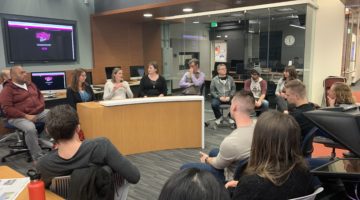By Juliana Bledsoe
Karthik Rohatgi is a seventeen-year-old senior at the Davidson Academy here at the University of Nevada, Reno, and while in some ways he is a typical high school student, he is also helping change the lives of the children of low-income families in the community.
Not only is his venture non-profit organization, Farm Fresh For Kids, helping to get fresh fruits and vegetables to children in low-income families in our area, but he is also working to benefit small-scale farmers in the local food-shed as well.
“Farm Fresh for Kids is a nonprofit that I’ve been working on for the past few years with a couple of the other Davidson Academy students,” said Rohatgi, “What we’ve been doing is giving out these farmers market vouchers.
We give them out at HAWK, WIC clinics, Nevada Health Alliance, Nevada Early Intervention Clinics, and a bunch of clinics around town.” These vouchers are then passed on to low-income patients who could benefit most from the program.
Aid is distributed based on the income dietary needs of the family, as well as age and the number of children.
“From there, they take the vouchers to the farmers markets to help them access healthy foods that they wouldn’t otherwise have,” Rohatgi said.

Karthik Rohatgi, a
senior at The Davidson
Academy, started the Farm Fresh For Kids program in order to supply local needy families with fresh fruits and vegetables.
Photo Courtesy of Farmfreshforkids.org
“We also pay the farmers for whatever vouchers they have taken in, so we end up benefiting the family and the farmer at the same time.” This year, Farm Fresh for Kids is partnering with Workman Farms, Salisha’s Delicious, Lattin Farms and The Great Basin Community Food Cooperative.
They are also handing out vouchers at the Wells Avenue clinic and Community Services Agency Head Start, as well as on campus at the UNR Student Outreach Clinic.
“We’ve found a lot of people, especially at the Great Basin Co-op, that are really excited about helping us,” Rohatgi said. The program provides vouchers to between 30-40 at-risk families per year, and Rohatgi estimates that the program has helped close to 200 families total thus far.
It places a strong emphasis in keeping that funding within the community by supporting local farmers, whom Rohatgi says have been bushed out by large chain supermarkets that don’t always offer the same quality of produce.
Each family receives $25-$30 in vouchers per month, which can be used with participating farmers at local farmer’s markets or at the GBCFC. “It wasn’t quite my idea,” Rohatgi said.
“There is a Massachusetts nonprofit Wholesome Waves that is doing the same thing; I read about that back in 2010, and I got the idea of starting it here, because in a lot of other states, the state government does a program like this, but Nevada doesn’t, so I thought that this would be a good place to follow Wholesome Waves model.”
Last year, the program reported that participants redeemed $910 worth of pro- gram vouchers, $895 of which was spent at local farmers markets. The remaining $15 was spent at The GBCFC.
In a follow-up questionnaire, 100 percent of the families reported that the program helped make their children more interested in eating fruits and vegetables, and the same percentage also reported that the program made it more easy to access this fresh, local produce year-round.
FFFK also works to help educate these families about the nutritional benefits of eating fresh fruits and vegetables.
It provides educational pamphlets on the importance of nutrition and how to maintain it, and it also distributes a cooking guide with “simple yet tasty recipes for some commonly encountered vegetables” that helps teach families the basic preparation of vegetables such as squashes and leafy greens.
FFFK does occasional deliveries of fresh vegetables from its partner farmers to Sierra Vista Title 1 Elementary School and the Head Start program office at Wooster High School.
In a talk Rohatgi gave at the Reno TEDx event last year, he expressed his belief that the American obesity epidemic is rooted in the relatively low access that many low-income families have to fresh, local produce.
“When the founding fathers contemplated the expansion of America, I don’t think that this is what they had in mind, “ Rohatgi said. However he addressed this is a serious issue that especially affects needy families.
He sites statistics such as that “U.S. house- holds with incomes less than or equal to 130 percent of the poverty line are most vulnerable for poor health outcomes partly because they purchase fewer fruits and vegetables than higher-income house- holds.” —Albert et. al, Am J Prev Med, 2006 May; 30(5): 365-70.
He also noted that needy families in this area are at an even greater disadvantage because the availability of fresh fruits and vegetables are relatively low.
Our agricultural zone is categorized as a food desert, and even the availability of a supermarket is a challenge when, as Rohatgi said in his TEDx talk, “Of the 25 nearest places that families can redeem their food stamps (to the University of Nevada, Reno), none of them are a full service grocery store.”
“All these factors together put low income families at a greater risk for obesity and related medical conditions including heart disease, Type 2 diabetes, hypertension and stroke,” he said during his talk. “This was my motivation when I founded Farm Fresh for Kids in January 2011.”
“He’s such a great person,” said Melissa Lance, Head of Media Convergence for the Davidson Institute, which oversees the Davidson Academy. “He’s so passionate about his philanthropy. It’s really cool.”
Rohatgi is the founder and president of FFFK, and he runs the organization with his friends and schoolmates in the Health and Social Justice Club at the Davidson Academy.
As he is a senior, he will be graduating this year, but other than attending one of the 13 colleges he applied to, he is not entirely sure what the future holds. “My main interests are in public health and statistics,” Rohatgi said.
“I’m also considering medicine, but I’m not sure yet. I have a whole bunch of interests in health disparities, anthropology, biostatistics, so I’m not sure where I’ll end up.”
Juliana Bledsoe can be reached at bledsoe7@sagebrush.unr.edu.












